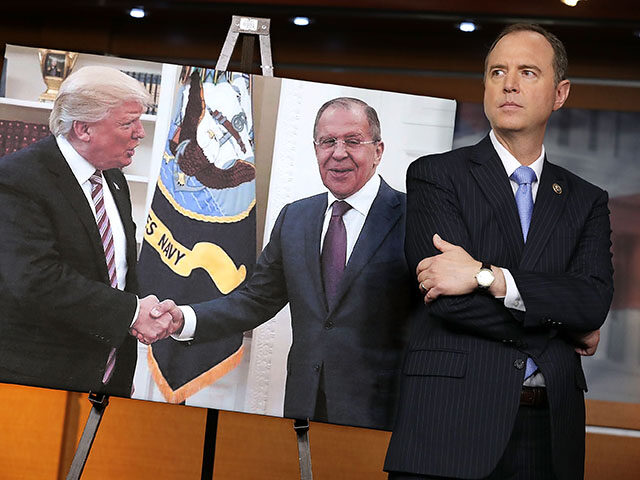Senior NPR business editor Uri Berliner admitted in an explosive op-ed published Tuesday that the public radio station’s RussiaGate reporting was a bust, and that it did not fess up to that after no “Russian collusion” was found between the Trump campaign and Russia.
Furthermore, Berliner admitted that then-California Senate candidate Rep. Adam Schiff (D-CA) became the news outlet’s “guiding hand” in this fruitless endeavor, and expressed regret in hitching its wagon to him. Schiff was the main pusher of the Russia collusion hoax in Congress and had repeatedly insisted there was “circumstantial evidence” of collusion.
Berliner, in his op-ed published in the Free Press, wrote that the rise of advocacy at NPR “took off” with the election of former President Donald Trump in 2016.
“As in many newsrooms, his election in 2016 was greeted at NPR with a mixture of disbelief, anger, and despair,” he wrote. “But what began as tough, straightforward coverage of a belligerent, truth-impaired president veered toward efforts to damage or topple Trump’s presidency.”
He said “persistent rumors” that the Trump campaign colluded with Russia “became the catnip that drove reporting.”
“At NPR, we hitched our wagon to Trump’s most visible antagonist, Representative Adam Schiff,” Berliner wrote, adding:
Schiff, who was the top Democrat on the House Intelligence Committee, became NPR’s guiding hand, its ever-present muse. By my count, NPR hosts interviewed Schiff 25 times about Trump and Russia. During many of those conversations, Schiff alluded to purported evidence of collusion. The Schiff talking points became the drumbeat of NPR news reports.
But, Berliner writes, when Special Counsel Robert Mueller “found no credible evidence of collusion, NPR’s coverage was notably sparse.”
“Russiagate quietly faded from our programming,” he wrote, before admonishing the NPR newsroom.
“It is one thing to swing and miss on a major story. Unfortunately, it happens. You follow the wrong leads, you get misled by sources you trusted, you’re emotionally invested in a narrative, and bits of circumstantial evidence never add up. It’s bad to blow a big story,” he said.
“What’s worse is to pretend it never happened, to move on with no mea culpas, no self-reflection. Especially when you expect high standards of transparency from public figures and institutions, but don’t practice those standards yourself. That’s what shatters trust and engenders cynicism about the media,” he continued.
NPR was not the only news outlet that drilled down into the bogus Russia collusion allegations — which started as opposition research against Trump funded by anti-Trump Republicans and then the Hillary Clinton campaign, and then spread through government channels before becoming the “roadmap” for the FBI’s investigation into the Trump campaign.
Reporters for the New York Times and the Washington Post were both awarded Pulitzer Prizes in national reporting for their coverage of the phony Russia collusion hoax.
As the Heritage Foundation’s Hans A. von Spakovsky wrote in a 2021 piece on FoxNews.com, after Russia collusion was thoroughly debunked:
In a series of 10 articles, Times reporters propagated a narrative detailing fictitious connections between the Kremlin and the Trump campaign, the president’s transition team, and the administration.
The Mueller investigation as well as the Senate Intelligence Committee affirmed that there is no evidence that President Trump or his staff conspired with the Russian government to impact the 2016 election. Special Counsel John Durham is now indicting some of those who were involved in creating what amounted to a political hoax that dogged the Trump administration for years.
Despite these findings, and the inaccuracies in the Times’ articles, the Pulitzer Prize board has not repealed the award. (Note that all principals are alive and perfectly capable of responding.)
Von Spakovsky noted that Times reporter Walter Duranty was also awarded the Pulitzer Prize in 1932 for a series of articles praising the Soviet Union and its dictator Joseph Stalin that relied on Soviet propaganda and covered up genocide.
Von Spakovsky noted that the Times did not issue a formal apology until 2003.
“Will it be 2089 before the New York Times (and the Washington Post) acknowledge their misleading reporting and apologize? And will the Pulitzer Prize board wait until all the principals are dead so it can ‘investigate’ the matter and issue a non-apology?” he wrote.
Follow Breitbart News’s Kristina Wong on ”X”, Truth Social, or on Facebook.

COMMENTS
Please let us know if you're having issues with commenting.